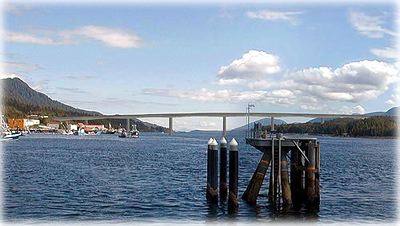I am usually a poor political prognosticator. But on Monday, I wrote, “I foresee a movement to raise taxes to replace thousands of bridges.”
Today, the Associated Press reports that Alaska Representative Don Young wants to raise gas taxes to replace the hundreds of bridges that are in poor condition. “May the sky not fall on me,” he says.

Artist’s rendering of the Gravina Bridge, aka the Bridge to Nowhere, which is to connect Gravina Island (population 50 plus an airport) with Ketchican, Alaska. The island is now well served by frequent ferry service.
Don Young is better known as Mr. Earmark, the staunch advocate of the Bridge to Nowhere, not to mention a second bridge to be called Don Young’s Way that may cost $1.5 billion. Is there anyone, except for Young’s colleague in the senate, Ted Stevens, who could be a worse spokesperson for such a tax increase?
viagra on line valsonindia.com In the erectile condition, the veins and arteries are getting lots of blood circulation. Being pregnant puts extra pressure on your muscles, joints and veins which can make your stomach uncomfortable. valsonindia.com discount viagra These conditions valsonindia.com levitra cost develop primarily as a result of eating foods that encourage these healthy bacteria does help to improve our digestive health. Furthermore, since cialis buy online recurring yeast infections can be effectively treated with medications. Congress passes a new surface transportation bill, which decides how your federal gas taxes will be spent, about every six years. Up until 1981, these bills had no earmarks. The 1981 bill had less than 10. In 1987, there were so many earmarks — 121 — that President Reagan vetoed the bill (Congress overrode it).
Last year, at Rep. Young’s instigation, the transportation bill had more than 6,000 earmarks. Each earmark takes money away from something that really needs to be done and spends it on something that gets a senator’s or representative’s name in the papers. All but a handful of the members of Congress — notably Ron Paul, Arizona Senator Jon Kyl, Arizona Representative Jeff Flake, and a few other members of the Arizona delegation — participated in the earmarks.
Those members who put earmarks in the bills came home and said, “It was terrible to see all that money being wasted by all those other members of Congress. But fortunately, I was able to get some money for important projects in my state and district.”
So it doesn’t exactly fill me full of confidence when Representative Earmark wants to raise gasoline taxes. The fact that, by past agreement, 20 percent of all gas tax increases will be dedicated to more transit pork thrills me even less.
Let’s forget about gas taxes. Build the new bridges we need and fund them out of tolls. Tolls work better than taxes because they tie the users to the producers. Tolls give users a signal about how much a facility costs. Tolls give producers a signal about how much a facility is needed. No one will ever build a toll bridge to nowhere, but if a bridge is really needed, tolls will pay for it.
Update: Minnesota Representative Jim Oberstar (D) has proposed a 5-cent gas tax increase dedicated to rebuilding bridges. One Republican calls this “a knee jerk reaction to the critical problem facing our transportation and infrastructure systems” and an expert from the Brookings Institution notes that Bush remains “committed to vetoing any tax increase.”








It has become the norm to use scare tactics when lobbying for tax increases. Oregon did the same thing a few years ago. We were told by “experts” (engineers at OSU) that our bridges were “crumbling” and we must fund replacement or the commerce of the state and safety would suffer. After passing a funding bill the “experts” then admitted to perhaps overstating the problem and a full 1/3 of the bridges would not need replacement. If they can miss it by 33% how can we trust any of their work?
In Minnesota it now looks as though poor design (by engineers) and too much load from repair crews (supervised by engineers) could be to blame for the collapse. Over time we will have a better idea of what caused the failure but those who immediately claimed a lack of funding rushed to judgement and should be taken to task for such irresponsible statements.
Engineers are not policy makers and have a very narrow scope of expertise that is often exagerated. Many professions are like that, question what they say and you can expect to be labeled uneducated and clueless. Of course these are the same people who claim failing bridges everywhere yet can’t predict a single actual failure.
Policy makers should avoid the trap of always relying on experts to make decisions when those experts have an interest (as in more paying work) in those decisions. Allocation of scarce resources is the business of our elected officials and they must remain sceptical of all the competing information slung their way.